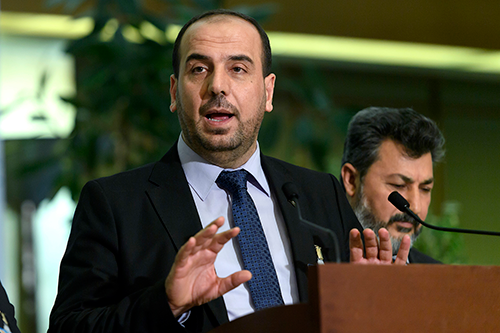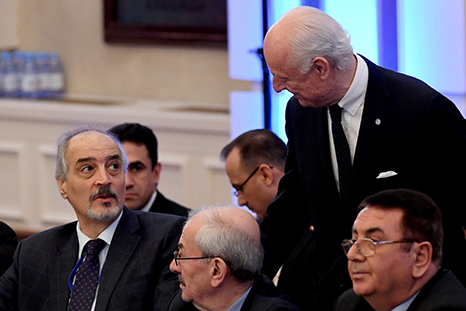



 Tahir Mustafa
Tahir MustafaThe UN-brokered talks in Geneva made little progress because the opposition groups have not fully reconciled to the ground realities following the defeat of the terrorists in Aleppo. Their foreign sponsors do not want peace in Syria.
Aware of the risks in arousing unrealistic expectations in the Syria peace talks in Geneva, the UN Special Envoy for Syria, Staffan de Mistura, tried to downplay any significant progress. He rhetorically asked while speaking to journalists at the UN headquarters in Geneva on February 22nd, a day before the talks started, “Am I expecting a breakthrough? No, I am not expecting a breakthrough.” Caution is always the best approach in such situations because the talks can be easily derailed by a minor slip up.
Talks got off to a shaky start when the opposition group threw a tantrum about the inclusion of two other groups described as the Moscow and Cairo platforms respectively. This made the opposition delegation much larger than was initially envisaged. And it was not merely finding enough chairs for them to sit on. While the official Syrian delegation had no problem with this larger opposition group, the Higher National Council (HNC) led by Nasr al-Hariri was upset. The HNC is Saudi-backed but their spokesman al-Hariri insisted his group was the “real opposition.”
After several hours of backroom talks that delayed the start of talks between the government and the opposition, de Mistura was able to convince al-Hariri to accept the two groups although they were seated separately from the HNC. “You must have seen that there was, in particular, a very heavy [presence] on the side of the opposition in the room… they were including also the armed groups… because, as you know, peace is made between those who fight each other,” said de Mistura.
Al-Hariri was quite upset at this turn of events. To make sure everybody understood the “importance” of him and his group, he proclaimed, “Today, the real opposition representing the Syrian people is the HNC. This delegation and the HNC, extends its hand to any national partner that adopts the will of the Syrian people,” al-Hariri, head of the HNC delegation, told reporters before the opening session. “We hope the Mos-cow and Cairo platforms will prioritize national interest and the interests of the Syrian people,” al-Hariri said.
How he or his group based in Saudi Arabia could speak on behalf of all the Syrian people was not explained or clear. This is the problem in Syria; every group claims to be the sole representative of the Syrian people when they are little more than agents of foreign powers. Their paychecks come from abroad. Since when has Saudi Arabia become the representative of the Syrian people? The Najdi Bedouins do not represent even the people of the Arabian Peninsula, ruling by coercion, brute force, and a reign of terror, to lay claim to represent the Syrian people.
Despite the hiccups, de Mistura wanted to present an upbeat assessment saying there had been “serious progress” made in the hours leading up to the opening ceremony in “forming a united political opposition,” but that there was still much work to be done. He said he was determined to maintain “a very proactive momentum” to allow for political discussions on governance, a new constitution, and elections under UN supervision and based on UN Security Council Resolution 2254.
Compared to previous rounds of talks in Geneva, the latest round appears to have made some progress, largely because of the changed ground realities in Syria. The Syrian government is clearly upbeat following its victory in Aleppo and infighting among various rebel groups. Further, the two sides — Syria’s official delegation and the opposition — sat in the same room to hold talks. In previous rounds of Geneva talks, opposition groups refused to sit in the same room insisting on the ludicrous demand that President Bashar al-Asad must first resign. Chastened by their defeat on the battlefield, opposition groups have had to modify their demands although still not sufficiently to make serious progress in the talks.
The Syrian government has repeatedly said it is willing to talk to the opposition provided they are serious about ending the foreign-instigated war on the country. President al-Asad has also said he would have no problem if there were other candidates contesting the presidential elections. What he would not accept is demands for him to step down. He has all along insisted that is to be decided by the Syrian people, not the Saudis, the Americans, Qataris, or Turks.

In Geneva, meanwhile, de Mistura said he hoped to set a “working plan” for the negotiations. “[Security Council Resolution] 2254 lays out a clear agenda, including specific language on governance, constitutions, elections, and even for the way negotiations should be timed,” de Mistura said. “That is what must now be discussed.”
The UN envoy said the biggest challenge before the delegates was a “lack of trust” as he appealed to the two sides to use the talks as an opportunity for peace. It is not difficult to identify the reasons for “lack of trust.” Syrian opposition groups are beholden to their paymasters, be they Americans or Saudis. It is to the credit of the Syrian government that it is still willing to sit down with these mercenaries who have little or no support inside Syria but insist the government must be handed to them on a silver platter.
Inside Syria, the circumstances have changed radically. The Syrian army with the backing of Russia, Iran, and Hizbullah has made steady pro-gress. This is on the battlefield. In the political arena as well, people have realized, even those who do not support al-Asad that they would rather have him in power than the head-chopping Saudi-Zionist-imperialist-backed monsters. The Syrian army’s convincing victory in Aleppo last December has reinforced this point.
This was also reflected in the two rounds of talks held in Astana, the Kazak capital (January and February), aimed at paving the way for political negotiations in Geneva. These were preceded by a ceasefire brokered by Russia, Turkey, and Iran that went into effect on December 30, 2016. The three countries also agreed to set up a mechanism to monitor the ceasefire. Excluded from the ceasefire agreement were such terrorist groups as Da‘ish, al-Qaeda, Jabhah al-Nusrah and their affiliates.
There are, however, other impediments as was evident from the statement of Turkish Defense Minister Fikri Isik on February 23rd, who said his country’s armed forces and allied militants were almost in full control of the Syrian city of al-Bab, close to the Turkish border. He claimed they had taken the city from the American- and Saudi-sponsored Da‘ish terrorists.

Isik also announced that Turkey was ready to join a US-led effort to capture Raqqah, the de facto capital of the terrorists in Syria. There are more than 500 US Special Forces operating in Syria, ostensibly to fight the terrorists but their real intentions are more sinister. The US, Israel, and Turkey want to create a de facto state in northern Syria that would prevent Iran’s help from reaching the Hizbullah fighters in Lebanon.
This was also part of the plan when Donald Trump announced that he wanted to establish “safe zones” in Syria to “protect” the refugees so that they would not come to the US. He has already barred their entry. To assess the feasibility of establishing “safe zones” Trump sent Defence Secretary James “Mad Dog” Mattis to the region. Mattis is supposed to make his recommendations soon. There is also talk in Washington that the US would send additional ground troops to Syria.
Further worrying developments have been noticeable. On February 21st, Senator John McCain again entered Syria illegally (he had entered Syria in May 2013 where he had met most of the terrorist leaders that the US is supposedly fighting). Unfortunately he was far away from the range of Syrian ground troops otherwise his capture and trial for illegal entry into Syria would have brought cheer to most justice- and freedom-loving people worldwide. Yet such brazen disregard for the sovereignty of another country is what American politicians are notorious for.
Turkey and Saudi Arabia have also increased their mischief. Despite the defeat of US-Saudi-Turkish-backed terrorists in Aleppo, Turkish President Recep Tayip Erdogan on a visit to Riyadh on February 14th agreed with the Saudis that they would send ground troops into Syria. Turkish troops are already there (in al-Bab). Saudi Foreign Minister Adel al-Jubeir said that the Kingdom was prepared to send ground troops but he added a caveat: as part of a US-led campaign. He also said the Saudis would only fight the Da‘ish terrorists. Really?
While the Saudis have no fighting skills — they are only good at chopping heads of poor expatriate workers or helpless maids — the announcement that they wanted to send ground troops to Syria has malevolent intent. The US-Zionist-Saudi-Turkish cabal has not given up on its mischievous plot to overthrow the government of President al-Asad. The only thing preventing this from happening is the determination of the Syrian army and the backing of its friends: Russia, Iran, and Hizbullah.
Syria, it seems is still a long way away from achieving peace, regardless of how many rounds of talks are held in Geneva. The only option for the resistance front is to continue to fight until the last remnants of the terrorists are either killed or driven out of Syria completely.
